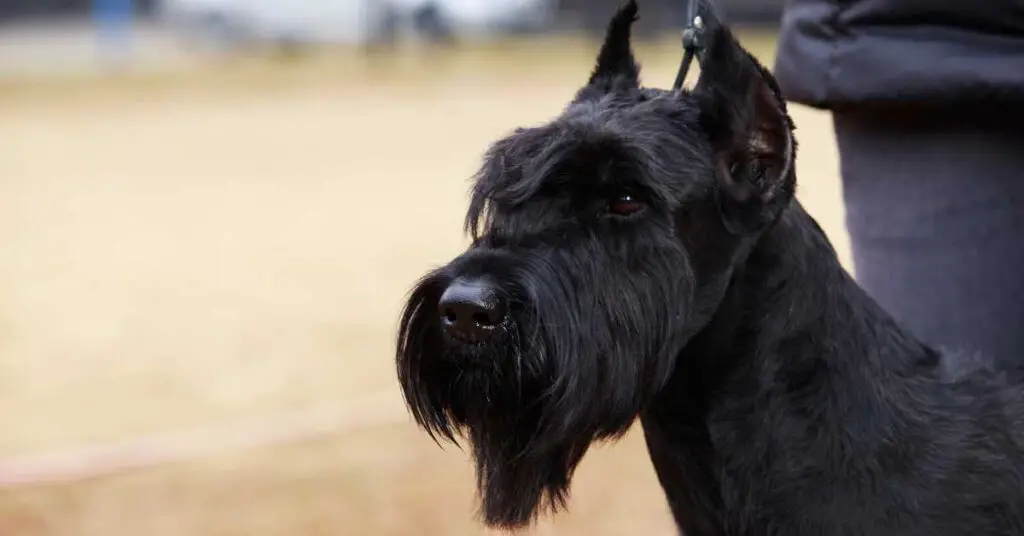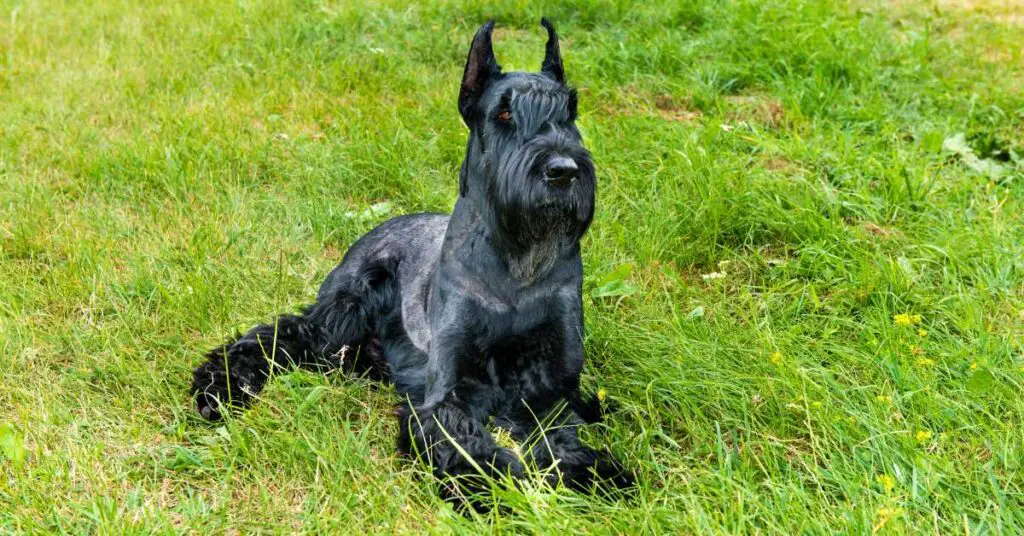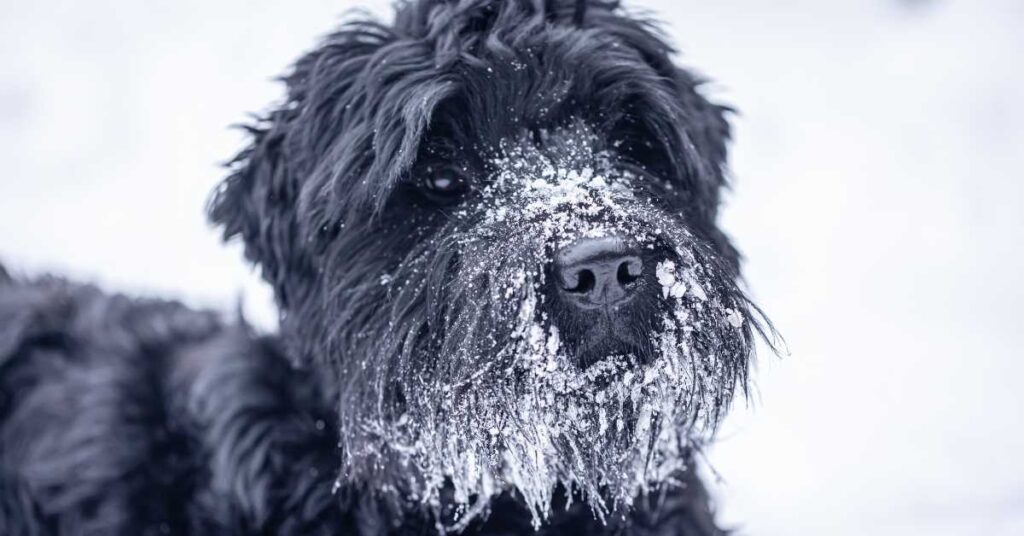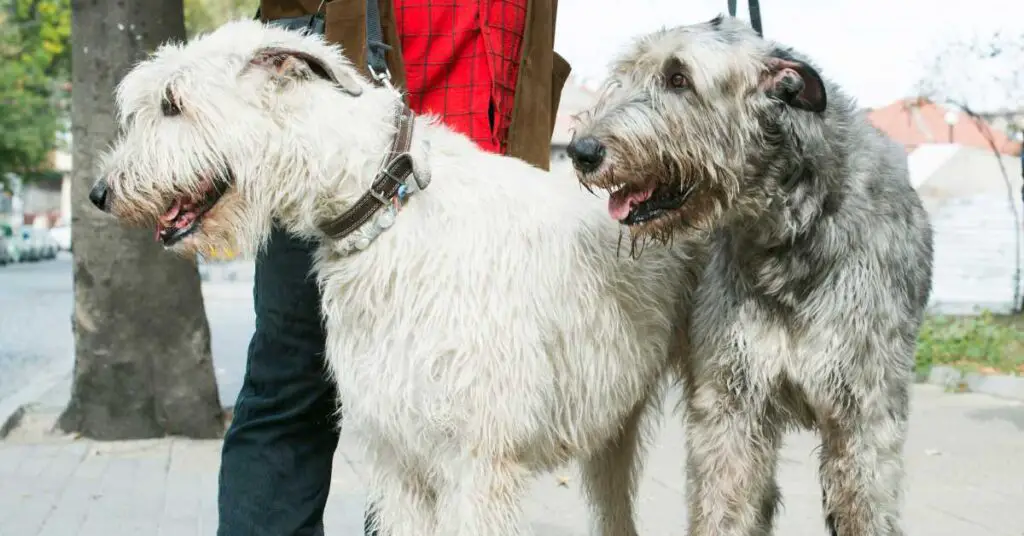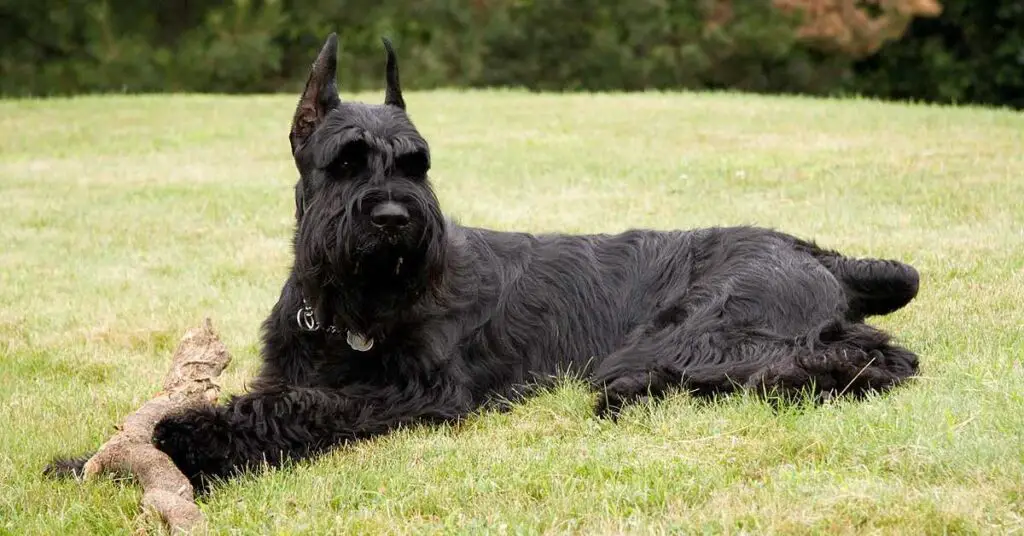Giant Schnauzers are a popular breed known for their distinctive appearance and loyal personalities. However, there is a common misconception that they are aggressive dogs. This article will explore the temperament of Giant Schnauzers and address whether or not they are naturally aggressive.
Understanding the Giant Schnauzer temperament is crucial in determining whether or not they are aggressive. These dogs are highly intelligent, confident, and protective of their family. They were originally bred to be working dogs, so they have a strong desire to please their owners and are eager to learn new tasks. However, their protective nature can sometimes be misinterpreted as aggression, especially if they are not properly trained and socialized.
Key Takeaways
- Giant Schnauzers are not naturally aggressive, but their protective nature can sometimes be misinterpreted as aggression.
- Factors such as improper training and socialization, fear, and territoriality can contribute to aggression in Giant Schnauzers.
- To prevent aggression, it is important to properly train and socialize your Giant Schnauzer and seek professional help if needed.
Understanding the Giant Schnauzer Temperament
Giant Schnauzers are known for their loyalty, intelligence, and protective nature. However, some people may wonder if they are aggressive. Understanding the temperament of the Giant Schnauzer can help answer this question.
Giant Schnauzers are bred to be working dogs, which means they have a strong instinct to protect their family and territory. This can sometimes be mistaken for aggression, but it is actually a natural behavior for this breed.
It is important to note that aggression is not a desirable trait in the Giant Schnauzer breed standard. Responsible breeders will select for temperament, which includes a stable and confident personality.
Socialization is also important for the Giant Schnauzer. Early exposure to different people, animals, and environments can help prevent fear and aggression. Training is also crucial for this breed. They are intelligent and eager to please, but they can be stubborn at times. Consistent and positive training methods are recommended.
Overall, the temperament of the Giant Schnauzer is loyal, intelligent, and protective. While they may have a natural instinct to protect, they are not inherently aggressive. Proper breeding, socialization, and training can help ensure a stable and confident personality.
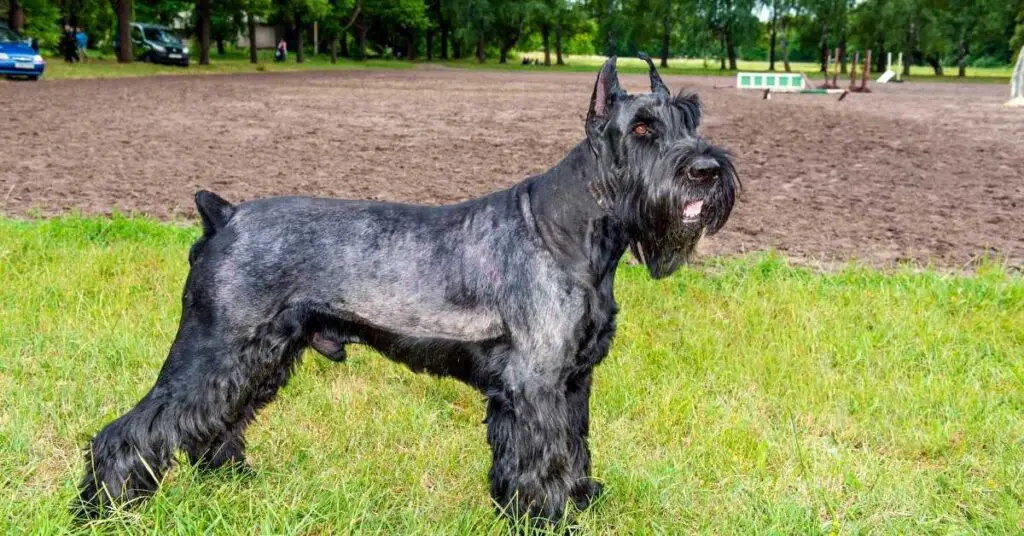
Factors Influencing Giant Schnauzer Aggression
Giant Schnauzers are known for their intelligence, loyalty, and protectiveness. However, some people may be concerned about their potential for aggression. While not all Giant Schnauzers are aggressive, there are several factors that can influence their behavior.
Genetics
Like all dog breeds, genetics can play a role in Giant Schnauzer aggression. Some lines may have a higher likelihood of exhibiting aggressive behavior due to their breeding history. However, it’s important to note that genetics are not the only factor and not all Giant Schnauzers with a certain lineage will be aggressive.
Training
Training is a crucial component in preventing or managing aggressive behavior in Giant Schnauzers. Proper socialization and obedience training can help ensure that your dog is well-behaved and less likely to exhibit aggressive behavior. However, if a Giant Schnauzer is not trained properly or is trained using harsh methods, this can actually increase the likelihood of aggressive behavior.
Environment
The environment in which a Giant Schnauzer is raised can also impact their behavior. If a dog is raised in a chaotic or stressful environment, this can lead to anxiety and potentially aggressive behavior. Additionally, if a Giant Schnauzer is not given enough exercise or mental stimulation, they may become bored and exhibit destructive or aggressive behavior.
In conclusion, while genetics can play a role in Giant Schnauzer aggression, training and environment are also important factors to consider. Proper training and a positive environment can help prevent or manage aggressive behavior in Giant Schnauzers.
Common Behavioral Issues in Giant Schnauzers
Giant Schnauzers are known for their intelligence, loyalty, and protective nature. However, like all dog breeds, they can develop behavioral issues if not properly trained and socialized. Here are some common behavioral issues that Giant Schnauzer owners should be aware of:
Aggression
Giant Schnauzers can be prone to aggression, especially if they are not properly socialized. They are protective of their family and can become aggressive towards strangers or other dogs if they perceive them as a threat. It is important to socialize your Giant Schnauzer from a young age and to teach them appropriate behavior around people and other animals.
Separation Anxiety
Giant Schnauzers are known for their loyalty to their owners and can become anxious when separated from them. This can lead to destructive behavior, such as chewing or digging, and excessive barking. It is important to train your Giant Schnauzer to be comfortable with alone time and to provide them with plenty of mental and physical stimulation.
Boredom
Giant Schnauzers are highly intelligent dogs and require plenty of mental stimulation to prevent boredom. If they are not given enough exercise or mental stimulation, they can become destructive and develop behavioral issues. It is important to provide your Giant Schnauzer with plenty of exercise, training, and interactive toys to keep them mentally and physically engaged.
Dominance
Giant Schnauzers can be dominant dogs and may try to assert themselves as the alpha in the household. This can lead to disobedience and aggressive behavior towards family members. It is important to establish yourself as the pack leader and to provide consistent training and boundaries for your Giant Schnauzer.
In summary, Giant Schnauzers are intelligent and loyal dogs, but they can develop behavioral issues if not properly trained and socialized. It is important to provide them with plenty of exercise, mental stimulation, and consistent training to prevent these issues from developing.
How to Prevent Aggression in Giant Schnauzers
Giant Schnauzers are a breed that can be prone to aggression if not properly socialized and trained. However, with the right approach, you can prevent aggression in your Giant Schnauzer and ensure that they are a well-behaved and friendly companion.
Proper Socialization
One of the keys to preventing aggression in your Giant Schnauzer is proper socialization. This means exposing your dog to a variety of people, animals, and environments from a young age. This will help them become comfortable and confident in different situations, reducing the likelihood of aggressive behavior.
To socialize your Giant Schnauzer, you should:
- Introduce them to new people and animals regularly
- Take them on walks in different environments, such as parks or busy streets
- Expose them to different sounds, such as traffic or fireworks
- Encourage positive interactions with other dogs and people
Consistent Training
Consistent training is also crucial in preventing aggression in your Giant Schnauzer. This means teaching them basic obedience commands, such as sit, stay, and come, and reinforcing these commands regularly. It also means setting clear boundaries and rules for your dog, and consistently enforcing them.
To train your Giant Schnauzer effectively, you should:
- Use positive reinforcement techniques, such as treats and praise, to reward good behavior
- Be consistent in your commands and expectations
- Avoid physical punishment, which can lead to fear and aggression
- Seek professional help if you are struggling with training your dog
Regular Exercise
Regular exercise is important for all dogs, but it is especially important for preventing aggression in Giant Schnauzers. These dogs are high-energy and need plenty of physical and mental stimulation to stay healthy and happy. Without enough exercise, they may become bored and restless, which can lead to destructive or aggressive behavior.
To ensure that your Giant Schnauzer gets enough exercise, you should:
- Take them on daily walks or runs
- Provide plenty of toys and puzzles to keep them mentally stimulated
- Consider enrolling them in obedience or agility classes
- Spend plenty of one-on-one time with them, playing and bonding
By following these tips, you can prevent aggression in your Giant Schnauzer and enjoy a happy, well-behaved companion.
When to Seek Professional Help
If you are experiencing any concerns or issues with your Giant Schnauzer’s behavior, it is important to seek professional help. A trained dog behaviorist or trainer can help you identify the root cause of the behavior and develop a plan to address it effectively.
Here are some signs that it may be time to seek professional help:
- Aggressive behavior: If your Giant Schnauzer is displaying aggressive behavior, such as growling, biting, or snapping, it is important to seek help immediately. Aggressive behavior can be dangerous and should not be ignored.
- Fearful behavior: If your Giant Schnauzer is displaying fearful behavior, such as cowering, shaking, or hiding, it may be a sign that they are experiencing anxiety or stress. A behaviorist can help you identify the triggers of this behavior and develop a plan to address it.
- Destructive behavior: If your Giant Schnauzer is exhibiting destructive behavior, such as chewing or digging, it may be a sign of boredom or anxiety. A trainer can help you develop a plan to provide your dog with the mental and physical stimulation they need.
- Excessive barking: If your Giant Schnauzer is barking excessively, it may be a sign of anxiety or boredom. A trainer can help you identify the cause of the barking and develop a plan to address it.
Remember, seeking professional help is not a sign of failure as a dog owner. It is a proactive step towards ensuring the health and happiness of your Giant Schnauzer.
Frequently Asked Questions
What is the temperament of Giant Schnauzers?
Giant Schnauzers are known for their intelligence, loyalty, and protectiveness. They are also energetic and require regular exercise and mental stimulation. They can be affectionate with their family members but may be reserved with strangers.
Are Giant Schnauzers prone to aggression?
Giant Schnauzers can be prone to aggression if they are not properly trained and socialized. It is important to provide them with early socialization and training to ensure they are well-behaved and well-adjusted dogs.
Do Giant Schnauzers require a lot of training?
Giant Schnauzers are intelligent and eager to please, but they do require consistent and firm training. They respond well to positive reinforcement techniques, such as rewards and praise, and may require more advanced training for activities such as obedience competitions.
Are Giant Schnauzers good with other dogs?
Giant Schnauzers can be good with other dogs if they are properly socialized from a young age. However, they may be dominant and territorial, so it is important to supervise them when interacting with other dogs.
What are the cons of owning a Giant Schnauzer?
Giant Schnauzers require a lot of exercise and mental stimulation, so they may not be suitable for owners who cannot provide them with enough activity. They also require regular grooming and may have a high prey drive, which can make them difficult to handle around smaller animals.
Are Giant Schnauzers difficult to handle?
Giant Schnauzers can be difficult to handle if they are not properly trained and socialized. They are strong and energetic dogs that require a lot of exercise and mental stimulation. However, with proper training and socialization, they can make great companions for experienced dog owners.
Are Giant Schnauzers friendly dogs?
Giant Schnauzers are generally friendly and affectionate with their families but may be wary of strangers. With proper socialization and training, they can become well-adjusted and friendly dogs.
Are Giant Schnauzers hard to train?
Giant Schnauzers are intelligent and can learn quickly, but their independent nature can sometimes make them stubborn. With patience, consistency, and positive reinforcement techniques, they can be successfully trained.
Will a Giant Schnauzer bite?
Any dog can bite if provoked or frightened. Proper socialization, training, and responsible ownership can help minimize the risk of biting.’Any dog can bite if provoked or frightened. Proper socialization, training, and responsible ownership can help minimize the risk of biting.
What is the demeanor of a Giant Schnauzer?
The demeanor of a Giant Schnauzer is typically intelligent, loyal, and protective. They are known for their devotion to their families and can be affectionate with those they trust. With proper socialization and training, they can become well-adjusted, friendly dogs.
Will a Giant Schnauzer protect me?
Giant Schnauzers have a natural protective instinct and are likely to defend their families if they perceive a threat. However, it’s important to manage this protectiveness in a healthy way to prevent it from escalating into aggression.
Final Thoughts
In conclusion, Giant Schnauzers can be aggressive if they are not properly trained and socialized. However, this breed is not inherently aggressive and can make loving and loyal pets with the right care and attention.
If you are considering adding a Giant Schnauzer to your family, it is important to do your research and find a reputable breeder who prioritizes temperament and health. You should also be prepared to invest time and effort into training and socializing your dog, as well as providing plenty of exercise and mental stimulation.
Remember, every dog is an individual and may have different personality traits and needs. It is important to approach each dog with an open mind and a willingness to learn and adapt to their unique needs.
Overall, with proper care and attention, Giant Schnauzers can make wonderful companions for the right owner.

